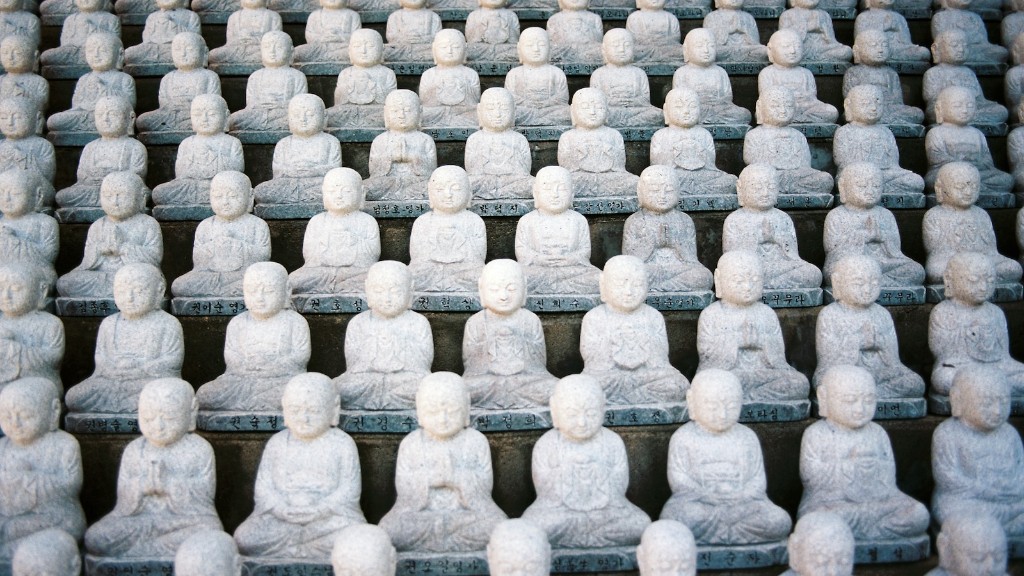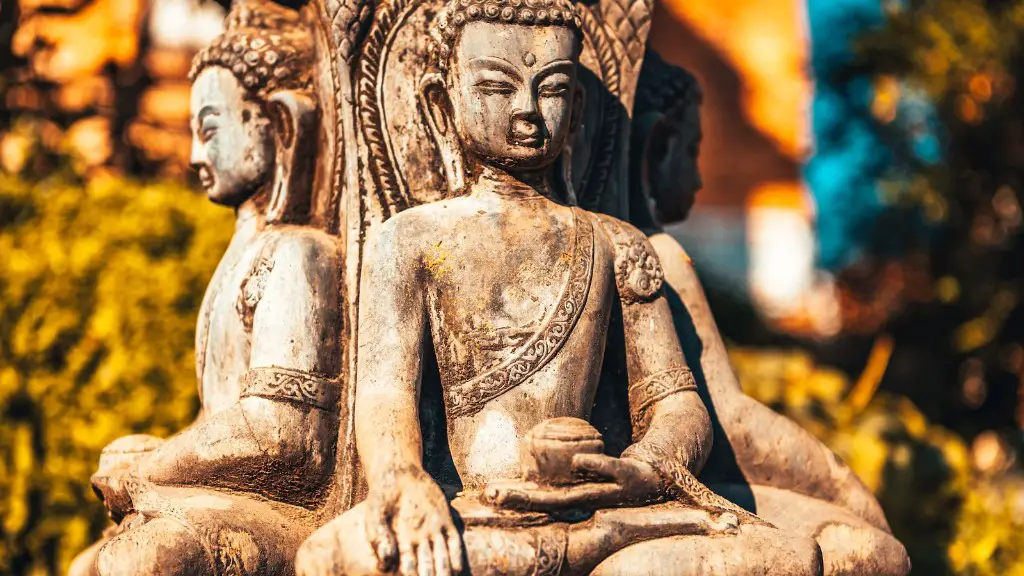Buddhism first came to Japan in the 6th century, but it wasn’t until the 12th century that Zen Buddhism began to take hold. The samurai were a class of warrior nobility that dominated Japanese society from the 12th to the 19th centuries. Zen Buddhism had a profound impact on the samurai and their way of life. It helped to shape their code of conduct, known as Bushido, which stressed loyalty, courage, and honor. Zen also had a hand in the development of kendo, the traditional Japanese martial art of sword fighting.
While the direct influence of Zen Buddhism on the Samurai is difficult to determine, it is clear that both Zen and the Samurai share similar values and ideals. Both Zen and the Samurai way of life place a great emphasis on personal honor, self-discipline, and living in the present moment. Additionally, both philosophies emphasize the need to be prepared for death at any time. This shared focus on personal honor, self-discipline, and living in the present moment likely created a common bond between the Samurai and Zen Buddhists, which may have resulted in the Samurai being influenced by Zen Buddhism.
How did Zen Buddhism influence Japanese culture?
Japanese Zen Buddhism is a sect of Buddhism that places great emphasis on intuition outside of conscious thought. This has helped to mold Japanese culture in many ways, including the development of tea ceremonies, landscape gardening, and martial arts. For many Westerners, Japanese Zen Buddhism is what they think of when they think of ancient Japan.
Zen Buddhism was introduced to Japan in the 12th century and quickly gained popularity among the samurai. The main teachings of Zen Buddhism are about meditation and reaching enlightenment. The samurai found these teachings useful in helping them to focus and calm their minds.
How important is Buddhism to the samurai
Buddhism was a major influence on the samurai way of life. The samurai followed the Buddhist teachings of karma and reincarnation. They believed that their actions in this life would determine their fate in the next life. Buddhism also influenced the samurai code of honor. The samurai believed in the need to be loyal and honorable, and they took great pride in their reputation.
The primary reason samurai adopted Zen Buddhism was the belief that it strengthened them on the battlefield. They believed that plans and strategy on the battlefield led to death, and Zen helped followers dismiss such thoughts. Zen also helped the samurai to develop a more detached and objective view of the world, which was useful in making quick and decisive decisions on the battlefield.
What is the significance of Zen Buddhism on Japanese art?
Zen art is a beautiful expression of the enlightened mind that exists within everyone. According to Zen doctrine, we all have the potential to be buddhas – enlightened beings – but only some of us have realized this potential. The buddhas are those who have awakened to their innate enlightenment, while the rest of us remain asleep to it. But just because we haven’t reached enlightenment yet doesn’t mean we can’t enjoy and appreciate the beauty of Zen art. It is a reminder that we all have the potential to awaken to our true nature.
Zen is a school of Buddhism which emphasises the practice of meditation as the key ingredient to awakening ones inner nature, compassion and wisdom. The practice of meditation (Zen in Japanese) as a means of attaining enlightenment was introduced, as we have seen, by the Buddha himself.
When did samurai adopt Zen Buddhism?
Some historians believe that the relationship between the samurai and Zen Buddhism can be traced back to the thirteenth century. This was a time when the warrior class was gaining power and there was an increased introduction of Zen teachings from China. It is believed that the samurai were attracted to the discipline and philosophy of Zen Buddhism, which helped to improve their martial skills. Over time, the samurai would come to play a major role in the spread of Zen Buddhism in Japan.
Zen Buddhism is a form of Buddhism that emphasizes meditation and mindfulness. It was introduced to Japan in the 13th century by Chinese Zen master Eisai. The samurai were attracted to Zen Buddhism because it helped them to overcome the fear of death and killing.Zen Buddhism became the dominant form of Buddhism among the samurai, but among the general populace Pure Land Buddhism was more popular. Pure Land Buddhism is a form of Buddhism that emphasizes faith and chanting the name of the Buddha Amitabha.
What was the most popular form of Buddhism among the samurai
Chan, also known as Zen, is a form of Mahayana Buddhism that developed in China. Chan was transmitted to Japan in the 13th century and quickly gained popularity among the samurai class. Between the 14th and 16th centuries, Chan became the most prominent form of Buddhism in Japan.
Zen Buddhism appealed to samurai because it helped them to drive all fear of death from their minds. Samurai believed that by meditating on the true nature of reality, they could become fearless in the face of danger.
What is the most important virtue to samurai?
According to Inazo Nitobe’s book Bushido, the lives of the samurai warriors were ruled by 7 principles called Bushido. These 7 rules were Righteousness, Loyalty, Honor, Respect, Honesty, Courage and Consistency. Righteousness (義 gi) was the most important virtue for the samurai.
The Bushido Code is the code that samurai live their lives by. It values loyalty, filial piety, and kindness above all else. A samurai who follows the Bushido Code is a true warrior.
What is Zen Buddhism influenced by
Zen is a form of Mahayana Buddhism that developed in China and later spread to Japan. Zen emphasizes the possibility of sudden enlightenment and has a strong connection with nature. Zen practitioners trace their beliefs back to India, but the Chinese influences are evident in the focus on sudden enlightenment and the close connection with nature.
Bushido, or the “Way of the Warrior”, is a code of conduct that stresses loyalty to one’s master, honour in every aspect of life, and service to one’s country. This code of conduct arose from Zen-Buddhism, Confucianism, and Shintoism, and teaches the importance of living a life of service and honour. By adhering to the Bushido code, samurai were able to live their lives with purpose and meaning, and die with dignity.
Why does Zen appeal to the samurai?
Zen Buddhism was introduced into Japan from China around this time. It held a great appeal for many samurai. Its austere and simple rituals, as well as the belief that salvation would come from within, provided an ideal philosophical background for the samurai’s own code of behavior.
Buddha, dharma, and sangha are the most important aspects of Zen life. Buddha is the one who attained enlightenment, dharma are the teachings he left behind, and sangha is the community of practitioners who uphold his beliefs. Together, these three things are what Zen practitioners aim to cultivate in their own lives.
Warp Up
Zen Buddhism was a significant influence on the samurai way of life. The samurai were a warrior caste in Japan and were expected to uphold a strict code of honor. Zen Buddhism helped the samurai to focus on the here and now and to live in the moment. This helped them to be better warriors as they were not burdened by thoughts of the past or the future. Zen also taught the samurai the importance of discipline and self-control, which were essential qualities for a successful warrior.
Zen Buddhism was influential to the samurai in several ways. It helped the samurai to develop a more disciplined and more spiritual way of life. It also gave them a new way of thinking about death and dying, which helped them to become more fearless in battle. Finally, it helped them to appreciate the simple things in life and to live in the present moment.




